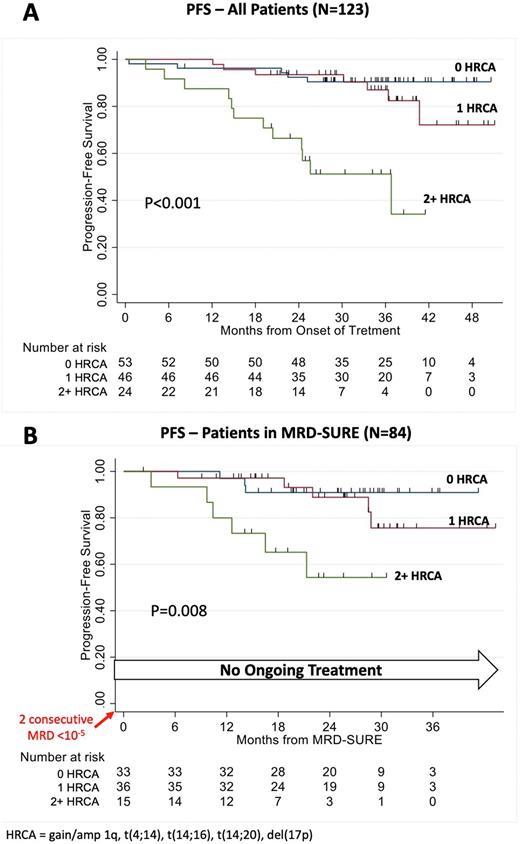Abstract

Background: Quadruplet induction and consolidation therapy in the setting of autologous hematopoietic cell transplantation (AHCT) leads to high rates of minimal/measurable residual disease (MRD) negativity in patients (pts) with newly diagnosed MM (NDMM), enabling MRD response-adapted therapy. The outcomes of patients ceasing therapy guided by MRD assessment have not been described.
Methods: Eligible pts in the MASTER trial had NDMM requiring treatment, CrCl≥40 ml/min, adequate liver and heart function, ECOG performance status 0-2 with no age limit. There was a planned enrichment for pts with high-risk cytogenetic abnormalities (HRCA). Pts received 4 cycles of Dara-KRd as induction, AHCT, and received 0, 4 or 8 cycles of Dara-KRd consolidation, according to MRD status as previously reported. MRD was evaluated by next generation sequencing (NGS, ClonoSEQ®) in all pts at end of induction, post-AHCT, and during each 4-cycle block of Dara-KRd consolidation. Primary endpoint was achievement of MRD negativity (<10-5 as defined by IMWG) in the intent-to-treat (ITT) population. Pts received therapy until achievement of two consecutive MRD <10-5 (i.e., post-induction and post-AHCT or post-AHCT and during consolidation). Pts with 2 consecutive MRD negative assessments entered treatment-free observation and MRD surveillance ("MRD-SURE") with MRD testing 6 months after treatment cessation and yearly thereafter. Pts completing consolidation without 2 consecutive MRD-negative assessments received lenalidomide maintenance. Results are reported by risk profile based on the presence of 0, 1 or 2+ HRCA [gain/amp 1q, t(4;14), t(14;16), t(14;20) or del(17p)].
Results: The study accrued 123 participants. Fifty-three (43%) had no HRCA, 46 (37%) had 1 and 24 (20%) had 2+ HRCA. Median age was 60 y (36-79), 23% of pts were non-white, 20% had ECOG 2, 21% had high LDH, and 20% R-ISS3. Median follow up is 34.1 mo. Overall (N=123) 3-year PFS was 91%, 87% and 51% (Panel A, P<0.001) and 3-year OS 96%, 91% and 75% (P=0.004) for patients with 0, 1 and 2+ HRCA respectively. Disease was trackable by NGS-MRD in 118 (96%) pts. Of these, 81% achieved MRD negativity, and 71 % MRD < 10-6. Among these 118 pts, 8% discontinued therapy prematurely (death, progression or withdraw of consent), 20% completed treatment and transitioned to lenalidomide maintenance and 71% reached 2 consecutive MRD negative assessments and entered MRD-SURE. Odds of reaching MRD-SURE was 66%, 82% and 63% for patients with 0, 1 or 2+ HR abnormalities respectively. Among the 84 patients who reached MRD-SURE, after median follow up post treatment cessation of 24.8 mo, 7 (8%) initiated lenalidomide-based therapy for MRD resurgence and 11 (13%) started treatment for disease progression. Sixty-six pts (79%) have remained off therapy, including 88%, 83% and 47% of patients with 0, 1 and 2+ HRCA. Four patients died after entering MRD-SURE, 2 from MM (21 and 24 mo. after progression) and 2 from unrelated causes (COVID-19 pneumonia and accidental fall). Two-year PFS from treatment cessation is 91%, 89% and 54% (Panel B, P=0.008) and 2-year OS 100%, 92% and 100% (P=0.51) for patients with 0, 1 or 2+ HRCA, respectively.
Conclusion: MM pts. with 0 or 1 HRCA reaching confirmed MRD negativity after quadruplet induction, AHCT and MRD-adapted consolidation have excellent PFS and OS in absence of maintenance therapy. Although the odds of achieving MRD-SURE were similar across risk strata, the risk of progression was higher among patients with ultra-high-risk MM (2+ HRCA) indicating the need for novel consolidation strategies. For the majority of patients with NDMM, quadruplet therapy, AHCT and MRD response-adapted treatment modulation provides the opportunity of durable treatment cessation without compromising disease control.
Disclosures
Costa:Adaptive Biotechnologies: Consultancy, Honoraria; Bristol Myers Squibb: Consultancy, Honoraria, Research Funding; Sanofi: Consultancy, Honoraria; AbbVie: Research Funding; Genentech: Research Funding; Amgen: Consultancy, Honoraria, Research Funding; Janssen: Consultancy, Honoraria, Research Funding. Chhabra:Sanofi: Research Funding; Janssen: Research Funding; GlaxoSmithKline: Honoraria; Amgen: Research Funding. Schmidt:Sanofi: Consultancy; Janssen: Consultancy. Dholaria:Vanderbilt University Medical Center: Current Employment; Gamida Cell: Consultancy; Orca Bio: Research Funding; Arivan: Consultancy; Molecular Templates: Research Funding; Wugen: Research Funding; BEAM Therapeutics: Consultancy; Janssen: Research Funding; Angiocrine: Research Funding; MJH Biosciences: Honoraria; Pfizer: Research Funding; Takeda: Research Funding; Poseida: Research Funding; BMS: Research Funding; MEI Pharma: Research Funding; Jazz Pharmaceuticals: Consultancy. Silbermann:Janssen: Membership on an entity's Board of Directors or advisory committees; Sanofi-Aventis: Membership on an entity's Board of Directors or advisory committees, Research Funding. Bal:Adaptive Biotechnologies: Consultancy. D'Souza:Pfizer, Janssen Oncology, Bristol-Myers Squibb/Celgene, Prothena: Consultancy, Membership on an entity's Board of Directors or advisory committees; Takeda, Sanofi, TeneoBio, Prothena, Caelum Biosciences, Janssen Oncology, Regeneron, Abbvie: Research Funding. Giri:Pack Health: Research Funding; OncLive: Honoraria; CareVive: Honoraria, Research Funding. Hari:Novartis: Honoraria; Amgen: Consultancy, Honoraria; Sanofi: Consultancy, Honoraria; Millennium: Research Funding; GlaxoSmithKline: Honoraria; Incyte: Honoraria; Kite: Consultancy, Honoraria; AbbVie: Honoraria; Pharmacyclics: Consultancy; Karyopharm: Consultancy, Honoraria; Takeda: Consultancy, Honoraria; Janssen: Consultancy, Honoraria; BMS: Consultancy, Honoraria, Research Funding; Spectrum Pharmaceuticals: Research Funding; Iovance: Current Employment. Dhakal:Karyopharm Therapeutics: Honoraria, Speakers Bureau; Natera: Consultancy; Janssen: Consultancy, Honoraria, Research Funding, Speakers Bureau; Amgen: Consultancy, Honoraria; GlaxoSmithKline: Consultancy, Honoraria, Research Funding; Sanofi: Consultancy, Honoraria, Research Funding, Speakers Bureau; BMS: Honoraria, Research Funding; Arcellx: Research Funding; Carsgen: Research Funding; Cartesian: Research Funding; Fate: Research Funding; Takeda: Honoraria; Pfizer: Membership on an entity's Board of Directors or advisory committees; AbbVie: Membership on an entity's Board of Directors or advisory committees; Genentech: Membership on an entity's Board of Directors or advisory committees.
OffLabel Disclosure:
Use of carfilzomib for newly diagnosed multiple myeloma
Author notes
 This icon denotes a clinically relevant abstract
This icon denotes a clinically relevant abstract
Asterisk with author names denotes non-ASH members.


This feature is available to Subscribers Only
Sign In or Create an Account Close Modal